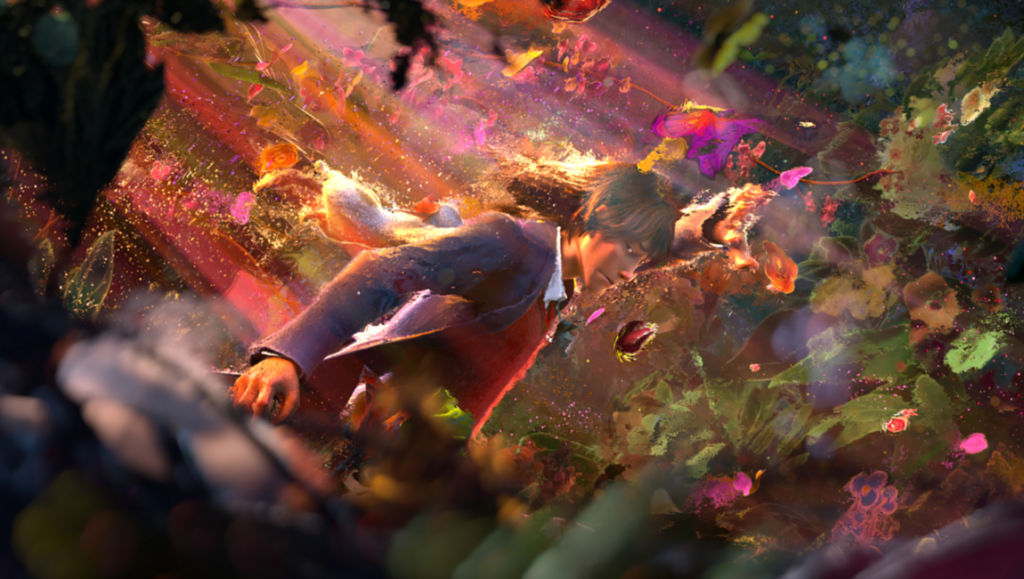It’s always frustrating when the awesome beauty of manicured, ornate spectacle gets caught in a quagmire of its own ideological reduction. When aesthetics, so carefully organized through the specificity of animated design, lose their entire capacity to emote, to enunciate the text that informs their movements, it becomes something of a cinematic flat tire. Tian Xiaopeng’s Deep Sea unfortunately delivers this kind of failure. A work labored over by a thousand-strong team of animators over a seven-year period, the film’s animation is consistently imbued with wonder and grace, yet it all culminates in a grotesque dismissal of child abuse. But to speak on the animation first: the film’s style is inspired by Chinese ink painting, utilizing 3D computer-animated graphics to realize a fusion of painterly impressionism and the kaleidoscopic, elastically textured kinetics of something like the recent Trolls series. But if that latter comparison may perhaps suggest a bit of a blight on the quality here, this team of animators execute that style with a level of detail and tactility that those American animated studio pictures haven’t managed to produce. Even as characters metamorphose and yield in the fashion of anthropomorphized jello, there’s a genuine palpability to the weightlessness, verging on the phantasmagoric. Infused with these mechanisms, and likely the reason behind the aesthetic pleasure, is an ingenuity of composition: live-action light designs have been photographed and combined with the animated sequences, ensuring that real and very pointedly expressionist light structures emphasize the spatial and proffer the dimensionality to each frame that so many 3D-animated films cannot begin to conjure. Ultimately, the uncaring and stilted landscapes of contemporary animated blockbusters have finally found a proficiency for expression, removed from the ironic, breakneck cynicism that has engulfed the media landscape.
Unfortunately, this all comes with a caveat for the shockingly depraved “lessons” that are to be drawn from the film’s narrative conclusions. Let’s start by drawing out the film’s first fifteen minutes of plot: our introduction to the film’s protagonist, Shenxiu, a child of no more than nine or ten, comes via voiceover (courtesy of Wang Tingwen). She writes cheerily to her mother about a cruise she, her father, his wife, and their new child are on. Prior to sending this text, however, she scrolls up to review earlier messages exchanged with her mother, and we see ones that read “another time” in response to Shenxiu asking to visit, or “please stop texting me.” Ultimately, she doesn’t send the text. Following this, Shenxiu’s phone sends her an automated “Happy Birthday” message while she sits at the dinner table, where her father and wife celebrate their child’s entrance into kindergarten, never mentioning the birthday girl. In the very next scene, Shenxiu watches a video of her estranged mother and father celebrating the birthday years prior, with her mother overzealously affirming their relationship: ”We’ll be together forever!” This overtly insistent contrast is hilariously crude, the kind of thing only thought up for teaching very small children basic emotional recognition. Not two minutes later, a water spout sweeps Shenxiu off the boat and into a purgatorial dreamscape, where she finds herself in an underwater restaurant, face to face with the head chef, Nanhe (who it so happens can magically turn himself into a clown), and the two embark on an entirely tangential journey to achieve a five-star rated establishment, where each and every animal would beg for a reservation.
What unfurls from these somewhat unbelievable opening minutes is digression — mostly haphazard plotting accompanied by a peppering of small reconventions with Shenxiu’s trauma over her neglect. By Deep Sea’s end, we are watching her spirit fight to live, to wake up and return back to the corporeal world alongside her father, his wife, and their child. A montage of her neglect provides the film’s climax: school, family, and counselors all dismissing the burden of isolation that has been thrown atop Shenxiu, reducing it to the woes every child will eventually go through. But she is completely alone with no support system, and she is actively thrown away by everyone with whom she seeks intimacy. The narrative conclusion to this plight is that she must fight to return to the living and that this spiritual fight she has endured will reconcile all the grief which churned her into something like a ghost. It’s a strange message to impart, that a child is responsible for such emotional conditions rather than the failures of the society into which they are born. As such, Deep Sea becomes something like a moral fairy tale, one so hyper-individualized that the only lesson we’re left to glean is “you’re on your own, so fight” — the means to do so being essentially compartmentalization. It’s a beautiful film, but also one that feels lacking in compassion or decency, embodying an ethic in ruins, where the future reflects our regressive approach to humanity.
DIRECTOR: Tian Xiaopeng; CAST: Wang Tingwen, Su Xin, Teng Kuixing; DISTRIBUTOR: Viva Pictures; IN THEATERS: November 24; RUNTIME: 1 hr. 52 min.
Originally published as part of InRO Weekly — Volume 1, Issue 23.5.
Enjoy our content? Want early access to features, interviews, and more? Support us on Patreon!


Comments are closed.